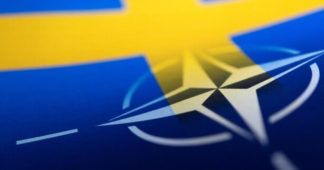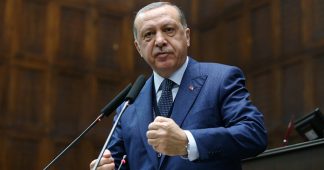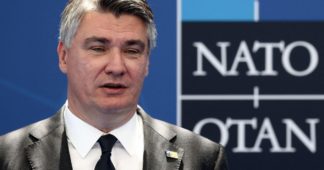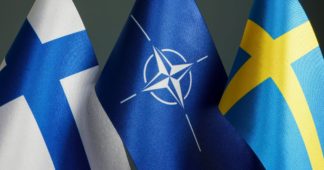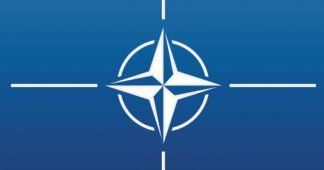May 13, 2022
Finland’s president and prime minister say they plan to end decades of neutrality and join NATO. Sweden is also expected to seek NATO membership. The Kremlin says Russia sees the expansion of NATO on its borders as a threat. “People on both sides will suffer,” says Reiner Braun, executive director of the International Peace Bureau, who warns Russia will escalate in response and move more nuclear weapons near the 830-mile-long Finland-Russia border.
Transcript
AMY GOODMAN: This is Democracy Now!, democracynow.org, The War and Peace Report. I’m Amy Goodman.
Finland’s president and prime minister announced their support Thursday for Finland to join NATO, ending decades of neutrality. The leaders called on Finland to apply for NATO membership without delay. Finland shares an 830-mile border with Russia. Sweden is also expected to join Finland in seeking NATO membership, something few discussed prior to Russia’s invasion of Ukraine. Russia responded to the news by threatening to take retaliatory steps in order to stop what it calls threats to its national security. The New York Times reports the addition of Finland and Sweden to NATO increases the prospects of a broader war between Russia and the West.
We go now to Berlin, Germany, where we’re joined by Reiner Braun, the executive director of the International Peace Bureau, German peace activist, historian, author, who has campaigned for years against NATO.
Can you talk about this decision made by Finland’s president and prime minister and the significance of this? It looks like Sweden is, you know, at their side in this.
REINER BRAUN: You know, it’s, again, a significant change in the security system in Europe. Above all and first, it is a break of a contract. Finland has a contract with Russia — first contract is from 1948, the second one is a new one from 1992 — which described neutrality and friendship between Finland and Russia as the background of their common relations. And Finland has not — had not canceled this treaty, so they are going against this treaty, which is a quite illegal action they are doing.
The second point is the relations between Central Europe or NATO and Russia by the military spending is about 50 to one up to now. Now it will be 70 or 80 to one. And it is obviously that Russia will be react. So we have again a continuation of the escalation spiral in the center of Europe, and this is not peaceful. What should be the next? Should be the next Moldavia and Georgia? Should be the next that we — that Kazakhstan or Uzbekistan will join NATO? It will be the next, Japan?
And what are the reaction of Russia? They will bring more nuclear weapons to the border of Poland and the Baltic countries. They will enlarge their military spending. Peoples on both sides will suffer. So it is definitely a step absolutely on the wrong direction, which is definitely not helpful for coming to a new security architecture after hopefully ending so quick as possible the war in Ukraine.
What we need are negotiations, and for Finland, which has a history of neutrality — Finland was a country of the OSCE and the CSCE agreements. There were the meetings, were in Helsinki. This time will be over. Finland will give up its independent, active position bringing East and West together, only for joining NATO, only for being a very small part in the NATO architecture. This is really an unpolitical and unsecurity step for a calm security system in Europe.
AMY GOODMAN: Can you talk about the letter that you helped co-write, both to President Putin and President Zelensky of Ukraine, calling for ceasefire?
REINER BRAUN: You know, for us was May 9th a historical day, which made Europe free from fascism. And the countries which bring the most victims were the Soviet Union, which included Russia and Ukraine. So, our letter was to say, when you make your speeches on the 8th or the 9th of May, after these speeches, you should come together and negotiate for peace in the tradition of the victory above the fascist system. And you should think about ways how you can combine again the people of these two countries, which have so many things in common, which have so many things in their common history, which have so many things together in the languages, in the agricultural system, in the treaties, in educational system. And we have to overcome this horrible split between these two countries.
And the first point which we are calling for was and is ceasefire. The 8th and the 9th of May passed. It is a pity that we could not start with the negotiations. But we will continue working on ceasefire. And I think we need more international pressure for these negotiations. And for me, the pope was sending a very interesting and very hopeful sign for starting these negotiations. I hope other political leaders in the world — maybe Macron, maybe Xi from China — will follow to bring these two countries, Russia and Ukraine, at the same table for negotiating.
AMY GOODMAN: Can you explain what the peace summit you and a number of other groups are planning in June in Spain?
REINER BRAUN: You know, there is a NATO summit. And NATO is the biggest military alliance in the world. NATO is the biggest military spender. Sixty percent of the whole money which is spending worldwide is spending by the NATO countries. So, this NATO summit will send signs in the absolutely wrong direction: more militarization, more actions against Russia and China, more encircling of these two countries.
And we want to protest and convince more parts of the public that this is the wrong way. This is the way to catastrophe. This is a way in a new nuclear war will be the final nuclear war. We cannot do this kind of politics when you want to solve the climate problem, when you want to overcome hunger. Hunger becomes much stronger since we have the Ukrainian war. How should these people in Africa survive when there are no crops any longer coming from Ukraine and Russia?
So, we want to say signs that we need an alternative politics. So our summit is a summit for making propaganda and actions for a policy of common security, which on the background says we have to take in account the security interests of all countries. And we need, nationally and internationally, a process of disarmament. It is not possible to spend any longer 2 trillion of U.S. dollars for military purposes, when people are suffering and when we do not know how to solve the climate problems.
AMY GOODMAN: Well, Reiner Braun, I want to thank you for being with us, executive director of the International Peace Bureau, German peace activist, historian and author, who has campaigned against a U.S. air base in Ramstein and also against NATO.
That does it for our broadcast. Democracy Now! is produced with Renée Feltz, Mike Burke, Deena Guzder, Messiah Rhodes, Nermeen Shaikh, María Taracena, Tami Woronoff, Camille Baker, Charina Nadura, Sam Alcoff, Tey-Marie Astudillo, John Hamilton, Robby Karran, Hany Massoud, Mary Conlon, Juan Carlos Dávila. Our executive director is Julie Crosby. Special thanks to Becca Staley, Jon Randolph, Paul Powell, Mike Di Filippo, Miguel Nogueira, Hugh Gran, Denis Moynihan, David Prude and Dennis McCormick.
I’ll be moderating a panel on voices beyond the borders at the PEN America global festival here in New York. Check our website at democracynow.org. It’s Saturday at the Judson Church. Stay safe.
We remind our readers that publication of articles on our site does not mean that we agree with what is written. Our policy is to publish anything which we consider of interest, so as to assist our readers in forming their opinions. Sometimes we even publish articles with which we totally disagree, since we believe it is important for our readers to be informed on as wide a spectrum of views as possible.
